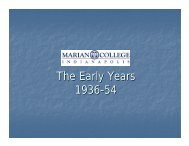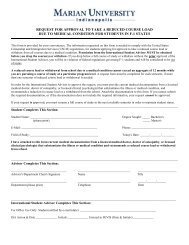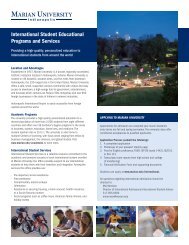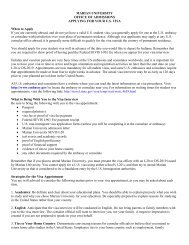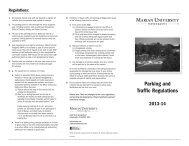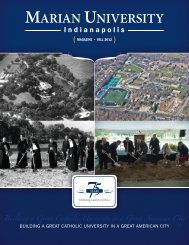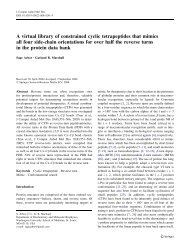2009-11 Marian University Course Catalog, fall 2010 edition
2009-11 Marian University Course Catalog, fall 2010 edition
2009-11 Marian University Course Catalog, fall 2010 edition
Create successful ePaper yourself
Turn your PDF publications into a flip-book with our unique Google optimized e-Paper software.
site, objectives, and credit hours in consultation with on-site<br />
supervisor. 45 hours work for 1 credit per semester, repeated<br />
up to 6 credit hours. Graded<br />
S/U. (SEM)<br />
LAW 380<br />
Special Topics in Law 3 credits<br />
Prerequisite: Instructors permission. Selected topics in the<br />
history, ethics, and practice of law in American and<br />
international judicial systems. (ADD)<br />
MAT 098<br />
Introductory Algebra 3 credits<br />
Algebraic principles and procedures are studied.<br />
Understanding of concepts, not memorization of<br />
manipulative skills, is emphasized. Tables and graphs are<br />
integrated to give numerical and visual meaning to algebraic<br />
expressions. This course partially satisfies the general<br />
education requirement in the scientific and quantitative<br />
understanding category for the associate degree. (SEM)<br />
MAT 105<br />
Intermediate Algebra 3 credits<br />
Designed for students needing a mathematics course to assist<br />
them in their major area of study, such as health science.<br />
Topics selected include linear equations, graphing,<br />
proportion, and variation applications, use of exponents. This<br />
course partially satisfies the general education requirement<br />
in the scientific and quantitative understanding category.<br />
(SEM)<br />
MAT <strong>11</strong>5<br />
Mathematics for Elementary<br />
School Teachers I 4 credits<br />
Prerequisite: Elementary education majors only. This is the<br />
first of a two-semester sequence of courses designed to<br />
strengthen, broaden, and enrich the student’s background in<br />
the areas associated with elementary school mathematics.<br />
Topics included are problem-solving, logic, sets, numeration<br />
systems, operations involving decimal and non-decimal<br />
bases, geometry of shape and size, and measurements.<br />
Manipulatives and hands-on experiences are utilized to<br />
demonstrate content. A weekly lab allows for additional work<br />
with manipulatives, student application of learned concepts,<br />
and a practicum experience in an elementary school. Three<br />
hours of lecture and two hours of lab per week. This course<br />
partially satisfies the general education requirement in the<br />
scientific and quantitative understanding category. (FAL)<br />
MAT <strong>11</strong>6<br />
Mathematics for Elementary<br />
School Teachers II 5 credits<br />
Prerequisite: MAT <strong>11</strong>5. This is the second of a two-semester<br />
sequence of courses designed to strengthen, broaden, and<br />
enrich the student’s background in the areas associated with<br />
elementary school mathematics. Attention is given to various<br />
problem-solving techniques. In addition to the text, outside<br />
readings from other sources, especially Teaching Children<br />
Mathematics, are required. Semester projects include the<br />
development of a file of mathematics activities, a<br />
mathematics learning center, and group presentations.<br />
Manipulatives and hands-on experiences are utilized to<br />
demonstrate content. Topics included are problem-solving,<br />
geometry of shape and size, measurement, fractions, and real<br />
numbers. Four hours of lecture and two hours of lab per<br />
week. (SPR)<br />
MAT 130<br />
Statistics in the Contemporary World 3 credits<br />
Statistical ideas and reasoning are used to study current<br />
issues. Sampling distributions, measurement, and concepts of<br />
inference are included in the course. Concepts are applied to<br />
current opinion polls, political, and social issues. This course<br />
partially satisfies the general education requirement in the<br />
scientific and quantitative understanding category. (FAL)<br />
MAT 140<br />
College Algebra 4 credits<br />
An integrated course emphasizing the concepts and skills<br />
needed to continue in mathematics. Topics included are<br />
polynomials, algebraic fractions, equations, inequalities,<br />
functions, matrices, permutations, and graphing of selected<br />
functions. This course partially satisfies the general education<br />
requirement in the scientific and quantitative understanding<br />
category. (FAL)<br />
MAT 142<br />
Trigonometry 2 credits<br />
Prerequisite: 140 or permission. Study of trigonometric<br />
functions, inverse trigonometric functions, and their graphs.<br />
The law of sines, the law of cosines, and sum and difference<br />
formulas are included. Applications are included in the<br />
solution of problems. (SPR)<br />
MAT 200<br />
Topics in Geometry for Educators 4 credits<br />
Prerequisite: <strong>11</strong>6. This course is designed to provide students<br />
with the opportunity to study and understand the concepts of<br />
the mathematical content needed for teaching mathematics<br />
at the middle school level. The course will help them to<br />
“discover” the why behind certain formulas, various ways to<br />
present the material, and deepen their understanding of the<br />
process of solution. Students will study topics in geometry<br />
and algebra appropriate for this level of teaching. (SPR)<br />
MAT 209<br />
Discrete Mathematics 3 credits<br />
This course begins the study of ideas of discrete mathematics<br />
including logic, techniques of proof, sets, relations, Boolean<br />
algebra, graph theory, recursion, counting techniques, and<br />
algorithms. This course partially satisfies the general<br />
education requirement in the scientific understanding<br />
category. (FAL)<br />
107



